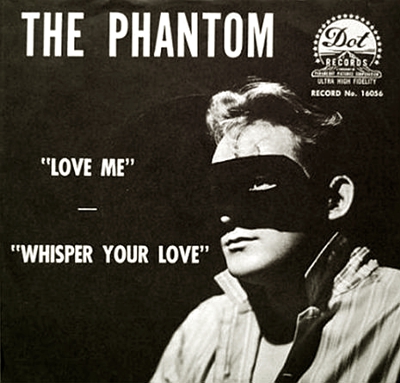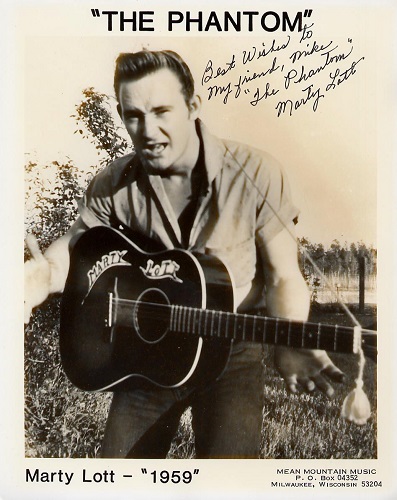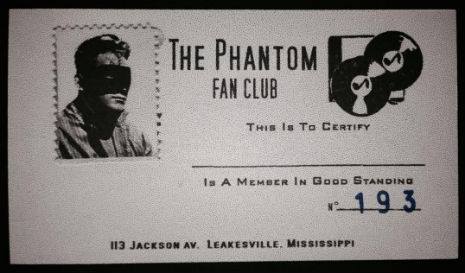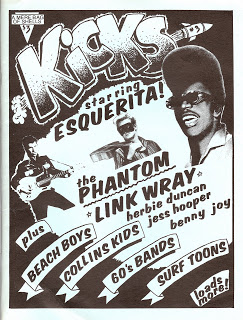The Phantom
Contributor: Dave Stephens

Minimalist
To almost the final extreme
One record only (plus a lo fi curiosity)
Not a hit
But 317,196 viewings on YouTube – and daily growing
Jerry Lott was born in Prichard, north of Mobile, Alabama on 30th January 1938, but moved to Leakesville in the adjoining state of Mississippi when he was still an infant. Very little is known about Jerry’s early years other than a statement from Derek Glenister – “He played country music until 1956 when Elvis Presley turned his head around.” Glenister interviewed the mysterious Mr Lott in 1980 and the results were published in New Kommotion #24 and subsequently incorporated in a BlackCat Rockabilly Europe online feature on the man.

What is known is that in 1958, Jerry recorded two songs, Whisper Your Love and Love Me in the Gulf Coast Studio in Mobile. With Jerry in the studio were Frank Holmes on guitar, Pete McCord bass guitar, Bill Yates on piano and H.H. Brooks on drums. Relative unknowns all, but not ignorant of the music coming out of Memphis a year or so earlier; in fact, McCord was also a song writer and Yates would eventually turn up at Sun, years later (see also footnote on Bill Yates).
Whisper Your Love was a kind of rockaballad thing but don’t let that put you off. There was a satisfying rawness about it all which rescued it from being typical teen fare. The slightly wandering pitch of the backing singers – possibly due to an errant recording speed – only serves to increase the primitivism.
The flip side was something else altogether. According to Jerry in the Glenister interview: “I’d worked three months on the other side of the record. Somebody said, ‘what you gonna put on the flip-side’ I hadn’t even thought about it. Someone suggested I wrote something like Elvis.”
Reportedly – (Jerry “The Phantom” Lott in Amoeblog) – it took him ten minutes to write Love Me.
The result? One and a half minutes which managed to take rockabilly, shake it all about such that any lingering elements of more innocent hillbilly music were flushed out, leaving something that was to presage garage, punk and psychobilly all in one go. To quote Tim Stegall in an article entitled Innocuousness That’s Insidious in The Austin Chronicle in 1995:
“You just swim through the lust and the echo and hope for the best, and the best you can hope for is: ‘Don’t hesitate, Ah cain’t wait!!!’ Then death-drop silence. ‘Love meh,’ the singer commands. ‘Love meh!’”
So he had a record. What did he do next? Enter villain, stage left. Jerry hied himself to Los Angeles where he stalked Pat Boone, following him into his place of worship where he accosted him – accounts are a little vague on this meeting of minds – and persuaded him to listen to the demo (which, in case the reader needs informing, was a million miles from the music Boone was famed for even if that fame did in part come from his habit of applying whitewash to black R&B hits).
Boone only loved the whole thing, adding his own touch of inventiveness to the project. To quote Tim Stegall again from his 1995 interview with Boone:
“‘The Phantom was my creation,’ Boone boasts in his relaxed, folksy manner that brings to mind no one more than Ronald Reagan. ‘He was a guy named Marty Lott, from somewhere down in Mississippi. He was a complete wild man, he was even wilder than Elvis! I had this idea that if an artist came along like Elvis, but with an air of mystery, where nobody knew who he was and he wore a mask and called himself the Phantom (which was my favorite comic book character), that he could be a smash! The kids would love him!’”

Boone promised to put the record out on his own Cooga Mooga label (a derivation from his euphemism for God, as in the Great Googa Mooga). He didn’t but he did get Jerry signed up to his (Pat’s) management and eventually Love Me, which became the A-side, saw release on Dot Records in 1960. Dot was Pat’s own label (and one that was even more guilty than Pat in the practice of covering other people’s records).
And it sunk. Like a million other rockabilly records. But it got noticed. The Cramps released their version on Unleashed And Unreleased in 1990. This is a live take from ’95. There were also versions from British and European bands in the retro rockabilly scene in the eighties and nineties; the Blue Cats, the Meteors, the Sting-Rays, the Rattlers, among others.
An alternate take – there were two cuts altogether – of Love Me saw release in France on the Rockinitis label. It was backed with a song called Hey! Bop Bop which in no way stands up against either Love Me or its flip, but given the shortage of material from Jerry, it had to go into the selections. That adjective, ‘primitive’ is still applicable.
And that was it for the recording career of The Phantom/Jerry Lott. He didn’t go on to make country records and retire in a mansion in Nashville. In 1966, a car he was travelling in, tumbled down a mountainside in Spartanburg, South Carolina. He sustained paralytically severe injuries.
He died on 4th September 1983. He was 45 years old.
Aahh, uhh, let’s go! Uhh
Press your lips to mine
And whisper I love you
Gotta have a chance that lasts
To do the things we wanna do
Don’t hesitate, I can’t wait, love me

Jerry Lott (with his stage name ‘Marty Lott’ on the guitar)
FOOTNOTES
1. There is absolutely no resemblance between Jerry’s Love Me and a song with that name by one Elvis Presley. Nor is it an attempt to ape Buddy Holly’s early rockabilly single with the same title.
2. If the reader ventures onto Spotify, he or she will discover an album entitled All My Own Stuff by a ‘Jerry Lott’ and below it a ‘© 2009 Gerald W Lott’, so I think we can safely say that this isn’t our Jerry Lott. AllMusic categorise it as “easy listening”.
3. Derek Glenister, who interviewed Jerry Lott in 1980 (see above), owned the Record Mart shop in Southend-on-Sea. Its RM label dealt in reissues of obscure Rockabilly records. You’ll find information about their releases at 45cat.
4. Pianist and singer Bill Yates was born in Georgia but spent much of his life in Memphis with occasional detours to places like Los Angeles. He spent his early years largely as an accompanist – Love Me is believed to be his recording debut – and doing odd things like acting as a bodyguard for Presley when on tour. His recording debut as a solo artist came with Mojo (as in Got My Mojo Working) and the splendid ballad All I Need Is You in 1961 on 1st Records, an affiliate of the Memphis based Home Of The Blues label. Further records followed on Bethlehem, Sun, Pixie and others but unfortunately for Bill they achieved absolutely no success whatsoever. Stylistically he was not unlike Charlie Rich if not quite that brilliant (but who is?) and it’s possible that the comparison didn’t help Bill.
5. I wrote the words below – slightly modified – in a section headed ‘Pat Boone and the practice of covering records’ in “RocknRoll”. Boone was by no means the only culprit but he probably made more money out of it than the others:
“The most heavily criticised artist to indulge in the practice of covering was Pat Boone. His first record in 1955, Two Hearts, Two Kisses, on Republic Records, was originally recorded by the Charms. As an aside, the other side of the Charms record, Hearts Of Stone, was covered by the Fontane Sisters who also recorded for Republic. Boone’s next single was Fats Domino‘s Ain’t That A Shame and his version went to number one. While it’s the Domino original we remember, Boone stole the sales at the time. In 1956, he covered two songs from Little Richard, Tutti Frutti and Long Tall Sally plus I Almost Lost My Mind originally from Ivory Joe Hunter.”
6. Apart from the Pat Boone records, one of the biggest hits from Dot Records in that era – three months prior to the release of Jerry Lott’s Love Me/Whisper Your Love on Dot 45-16056 in January 1960 – was Wink Martindale’s version of Deck Of Cards which made it to #1 in many countries, and US #7, UK #5.
7. Prior to Boone coming up with “The Phantom” as a nom de plume for Jerry (whose birth name was Jerry Lottis), the latter had frequently used the forename ‘Marty’ when performing. It even appeared on his headstone, with ‘♫ Marty ♫’ occupying the top line, and ‘Jerry Lott’ the line below.



Jerry Lott biography (Wikipedia)
Dave Stephens is the author of two books on popular music. His first, “RocknRoll”, is described by one reviewer as “probably the most useful single source of information on 50s & 60s music I’ve come across”. Dave followed this up with “London Rocks” in 2016, an analysis of the early years of the London (American) record label in the UK. You can follow him on Twitter @DangerousDaveXX
With thanks to fellow Toppermoster Keith Shackleton for leading us into the Phantom’s twilight zone.
TopperPost #781


Cramps released their version first on a single in 1980, and it appeared on two compilations in ‘83 and ‘84. That led to all those other bands covering it. Sting-rays put theirs out as a fake band called the Bananamen on the Cramps’ UK label.
I was going to write exactly what you wrote! I first heard the Cramps version on their record “Bad Music For Bad People” in 1984.
Dave, thanks for this fascinating piece. I knew The Cramps’ version but didn’t know the back story. Very strange mix of characters too – who would have expected Pat Boone to show up here?
He sounds like the bastard child of jerry Lee Lewis and Elvis. I’d not heard ‘love me‘ before but it has certainly burned itself into my brain. I doubt even Duane Eddy used as much reverb.
Thanks folk. We all owe a giant debt to Keith Shackleton for turning me on to the fabulous Phantom in the first place but I hadn’t expected the walk-on appearance from Pat (covers expert) Boone.
Great track. I first heard it on Charlie Gillett’s Honky Tonk way back in the early ’70’s.